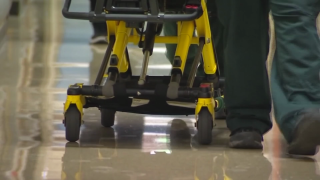
For the doctors and nurses fighting a novel pandemic, the days can be exhausting and stressful.
As El Paso nurse Adriana Saucedo marks 45 days in her own COVID-19 sickbed, she’s reflecting back on those she cared for in a special unit designated for those fighting the virus.
“I’ve had so many patients tell me I don’t want to die,” said Saucedo.
As a seasoned critical care nurse, Saucedo said she’s faced trauma. Still, the last few months have been especially taxing and filled with their own unique challenges.
“With COVID, you can have the stablest patient. And in a matter of minutes, they can immediately deteriorate, and we saw it all the time,” said Saucedo.
That was on top of increased stress outside of the hospital.
“That was a constant fear that any of us could take that home to our family," said Saucedo.
Local
The latest news from around North Texas.
It’s trauma that researchers at Baylor Scott and White’s Research Institute are studying to figure out how this pandemic is psychologically impacting front-line workers.
“If you look at 9/11. If you look at other infectious disease events like SARS or MERS where there’s some scientific data on psychological impacts on healthcare workers, we do know from previous data that people may have an increased likelihood of depression, anxiety even post-traumatic stress symptoms,” said Research Center Director of Behavioral Health Dr. Ann Marie Warren.
But thus far, Warren said research shows COVID-19 carries its own unique impacts.
“What I can share is that people on the front lines are definitely saying they’re having more burnout since COVID-19. They’re experiencing a greater deal of just stress at work, fear of getting COVID-19, fear of giving it to others. So we’re looking at COVID specific variables related to fears and concerns in addition to traditional psychological variables like depression and anxiety,” said Warren.
The study will take place in two parts.
One group will be followed for six months.
“We want this to be real-time data, so we can use it to inform interventions to support not only our front-line healthcare workers but also people in general,” said Warren.
The other will be followed for two years to better understand long-term impacts.
To learn more or enroll, click here.



